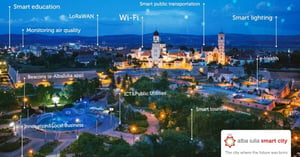This city portrait is in two parts. The first part (Alba Iulia Smart City: How Central Romania Quietly Created a Hidden Champion in Europe) described the ambitious plans of the Alba Iulia City Hall as it uses tourism and strong partnerships with private companies to transform Alba Iulia into Romania’s first smart city. This second part takes a closer look at some of the smart solutions being implemented there.
Organizing Alba Iulia’s Transformation
The municipal administration of Alba Iulia – a city of around 74,000 in Transylvania, central Romania – was announced in March to be a finalist in the country’s "Business Review Awards 2018" for its efforts in transforming Alba County’s capital into Romania’s first smart city. As Romania’s centenary celebrations approach, the city that formed the historical backdrop to its Great Union will complete the first part of its ambitious plans, having developed, tested or indeed fully implemented over 100 smart solutions.
Before getting started, the city researched solutions being applied elsewhere (such as those in the bee smart city network & community) to generate a best practice guide, which was completed in 2016. Public debate was organized through the city’s Ministry of Communications to engage Alba Iulia’s citizens – including all stakeholders across business, academia, and the general public – in the decision-making process. The guide paints a picture of how the city’s people think a smart Romanian city should look by 2020, as well as offering proposals on how to make it happen.
When it comes to implementation, many cities focus first on smart solutions involving transport and networking. Alba Iulia did, too, but with a different twist: they channelled EU funds into solutions to strengthen the city’s brand and its important tourism industry, bringing new visitors and, ultimately, getting the city broader recognition as an attractive place to live and work. They knew that the key to building up the city and forging smart public-private relations would be renewed attention from investors, who would see it as an increasingly strong and effective partner.
Its ongoing plans involve building its higher education and ICT industry as well as developing better healthcare, education, and mobility solutions for its citizens through the use of integrated smart technologies.
Networking Alba Iulia for Smarter Living
Significant technological upgrades were made possible through the city’s partnership with the company Orange Romania, which alone has been responsible for fourteen of the new solutions already implemented. Orange set up a secure 4G/4G+ wireless network with 229 hotspots across the city, including access points on public transport. Bluetooth Low Energy connections to the network were then leveraged to run ‘e-AlbaIulia’, an interactive electronic city guide which not only helps visitors explore the city and participate in treasure hunts but also offers deals at local bars and restaurants and provides information about local events, which helps to support local businesses and initiatives. The guide was developed using the Zoniz Open Platform, allowing the app to receive information about a location only once the user is in its vicinity. On top of being a smart tourism solution, e-AlbaIulia can act as a channel for citizens to provide feedback to the City Hall on certain issues and can be updated by the city to provide information on events of equal interest to residents as to guests.
The city’s new connectivity goes beyond encouraging tourism: as an early step toward the reduction of pollution and to inform environmental policies, solar-powered sensors installed through a partnership between the Romanian Direct One and Syswin Solutions now monitor Alba Iulia’s air quality by capturing data on eight top pollutants and correlating this with related environmental factors. The information is being made available to citizens as an indicator of the impact of their activities and can be viewed in real time or as a report showing the evolution of particular variables. Intending to make Alba Iulia generally more sustainable, this IoT network (LoRaWAN) includes 150 further sensors providing information on the city’s usage of lighting, power and water systems, leading to a range of resource- and cost-saving measures that are already being implemented.
The smart lighting system from Orange, for example, has enabled the remote management of public lighting by incorporating controllers run off the IoT network that allows public lighting to be programmed remotely and can optimize the brightness of its integrated LED system in real time. Named InteliLIGHT, it has reduced the city’s power consumption by up to 50%. Philips Lighting Romania is also involved in Alba Iulia's smart city upgrades, citing benefits such as reduced maintenance costs and greater operational efficiencies thanks to its data-driven, secure InteractCity connected lighting management platform.
Renovating Alba Iulia and the Creation of a Digital City
A major set of Alba Iulia’s smart city projects have involved upgrades to its infrastructure and, in some cases, saw entirely new infrastructure built. The historical Alba Carolina citadel – one of the top tourist attractions in the entire country, and lending its form to the city’s logo – was the subject of twenty different projects worth millions of euros which restored and revitalized the 300-year-old citadel from the ground up and established ongoing partnerships between the city, the local university and the private sector. This enormous undertaking conserved or rehabilitated the citadel’s many sites, at the same time increasing its capacity to host events such as conferences on a national and international scale, boosting its attractiveness to tourism for business as well as pleasure and earning it the tag European Destination of Excellence in 2012.
People experiencing the citadel on foot can select from among three themed itineraries to explore its gates, bastions or fortifications in greater detail. Alba Iulia has gone a step further, though, and ensured that its famous citadel can be visited even by those unable to travel: taking advantage of the new network, EuroJobs has generated a copy of the citadel in virtual space, run on its own dedicated platform and accessible to anyone with a pair of 3D virtual reality glasses. Virtual tours allow a 360-degree view of many of the citadel’s sights as they now appear, and a smartphone extension brings history to life by integrating the virtual tour of the modern citadel with visions of the past. Thinking beyond the citadel, Alba Iulia is now in the process of creating a high-resolution digital version of the entire city, which it hopes will not only be useful for exploration and discovery but also for planning and decision-making as well as pitching ideas to potential investors. The final desktop app (including a virtual reality option) will connect virtual guests within the space.
Already active in the Romanian capital of Bucharest, the Questo system is currently being investigated to generate further virtual tours of a different, more interactive nature. The system allows users to create discovery routes of their own, with a story being an important element of each unique tour. As well as being an interesting addition to the growing digital presence of Alba Iulia, the system could become an important tool for guides, private citizens and tourists, as well as a new way for educators to engage their students to learn about the city.
Moving the People: Improving Mobility in Alba Iulia
Construction in Alba Iulia was not limited to the Alba Carolina citadel. Realizing that a higher influx of people would create a need for better transportation management, the city’s pilot project included several advances regarding smart transportation and smart parking systems.
In the testing stage is a set of 50 smart parking sensors proposed by Vegacomp Consulting, which can detect changes in the nearby magnetic field to determine how many cars are present in a given parking lot. Reports are produced to inform city planning. Operating on a similar principle but a more individual scale are sensors from Direct One, which provide real-time information on the availability of parking spaces to anyone using the City Parking app, developed by Life is Hard company. A whole suite of software is being developed by Parking Plus, which goes beyond the availability of spaces and into related functions such as smart garage booking and access as well as a one-click payment system.
Encouraging a shift away from private vehicles, the city’s parks and bicycle lanes have been upgraded and intelligent public transportation solutions are being implemented to improve mobility and reduce the stress involved in getting around a city. Fifteen methods of transport have already been targeted by Orange’s smart system, allowing users to locate and track vehicles in real-time as well as providing secure Wi-Fi access while travelling. An e-bike rental and sharing system is also in the works, that will enable wireless battery charging for a convenient and eco-friendly journey.
The city’s unique initial focus on tourism has nonetheless led to its pilot project providing a holistic approach to becoming smarter. In addition to the solutions mentioned above, several healthcare and health monitoring systems aimed at all age groups and demographics have been produced in partnership with the Cluj IT Cluster, Vichi Farm (Alphega Group member), Elisa Med and Physiomed helping private citizens to be better serviced and informed, and an analysis of the city’s investment potential has been performed in conjunction with other cities around the world, leading to predictions of the impact of new initiatives and projects going forward. The city’s digital strengths are also being leveraged to generate virtual classrooms with new interactive teaching tools. Smart City Alba Iulia has truly earned its centennial celebrations and has created something inspiring for the future of all smart cities.

“What Alba Iulia has achieved with a focused smart city strategy is impressive. Other cities can look to the 100 solutions that Alba Iulia has implemented and learn from this great example of a truly hidden champion in Europe. The fact that Alba Iulia is not a big city, but a small one that heavily relied on tourism, makes the development even more impressive”, recognizes Bart Gorynski, Managing Partner of bee smart city.
Access Hundreds of Smart City Solutions for Free
For more best practice solutions, including those of Alba Iulia Smart City, join the leading global smart city network and community, featuring hundreds of solutions implemented in more than 1,000 cities and communities. Join today and contribute to creating smarter cities and communities.


